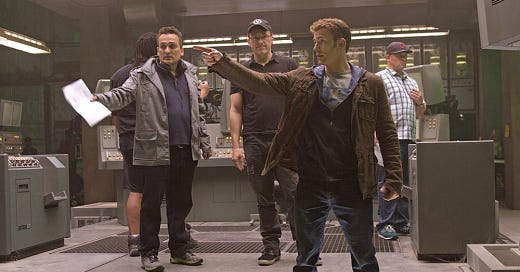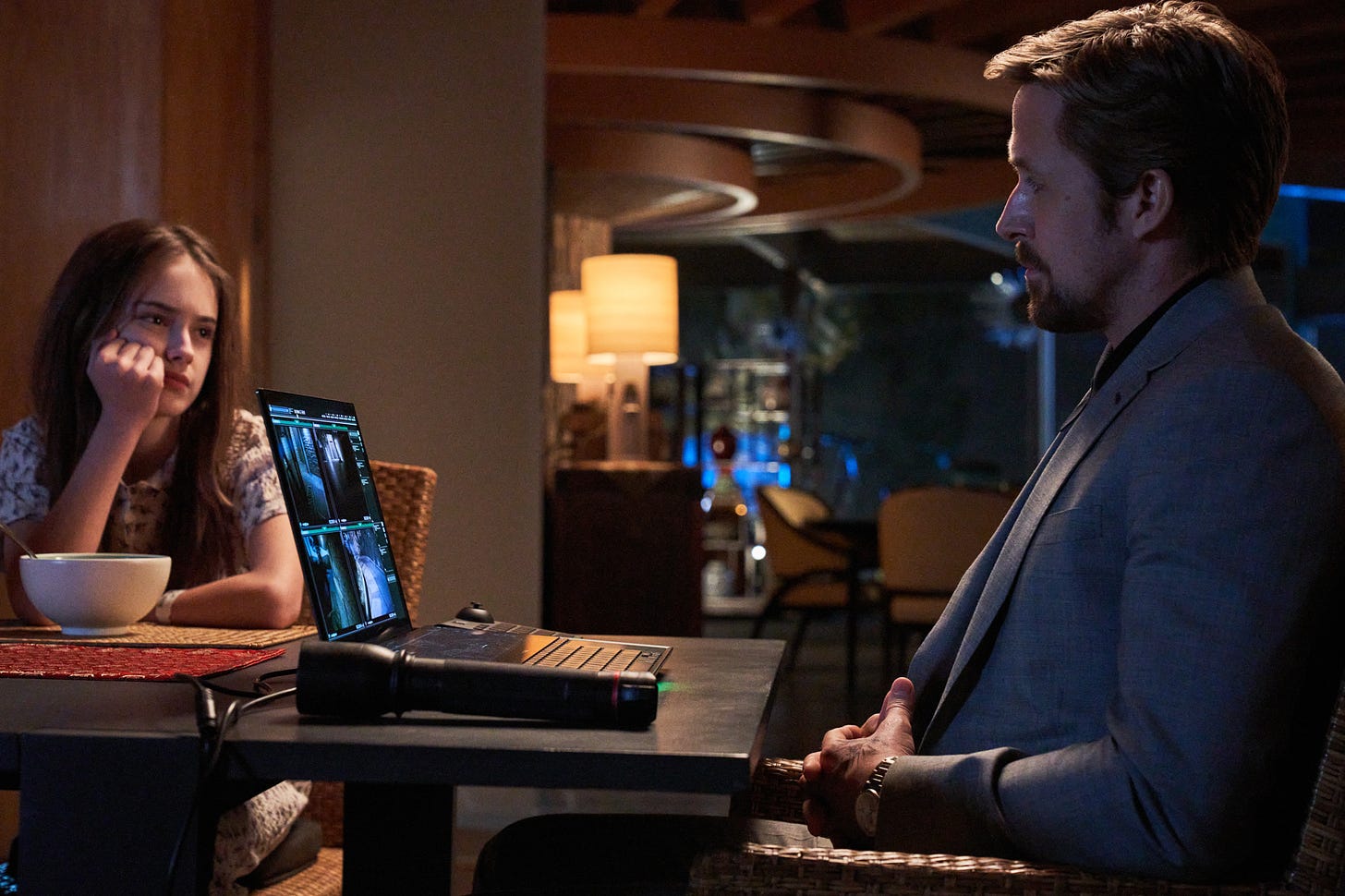Do the Russo Brothers have any Idea what they’re talking about?
A recent profile finds the directors of 'Avengers: Endgame' and 'The Gray Man' offering a vision of movies' future. Does it make any sense?
In a recent Variety profile, Joe and Anthony Russo, the filmmaking brothers most famously responsible for a string of super-successful Marvel movies, opined about the future of movies. Drawing on their own experience, professional plans, and intuition, they painted a picture of a film industry still figuring out how to incorporate the upheaval of the streaming era (fair) and about to undergo an even more radical transformation due to other technological developments. It’s here that the Russos’ thinking gets a little, well, fuzzy. Here’s a passage I’ve been turning over and over in my mind since reading it last week:
“Filmmaking is going to transform into some other medium,” Joe says, growing more animated the longer we dwell on this topic. “I don’t know what that media is going to be. My guess is that when you can sit in your house, turn to one of the actors that is standing in front of you and say, ‘Hey, Tom Cruise, hold on a second. Tell me about how you filmed this scene,’ and the AI-fueled Tom Cruise can turn to you and start explaining, it’s over at that point, right? That’s when technology will dominate whatever new form of storytelling is coming.”
Let’s unpack that: the death of movies as we know it will arrive at the moment we can create an artificial intelligence that can imitate Tom Cruise and give us behind-the-scenes details about the making of the movie we’re watching. Such technology will tap into a deeply and widely felt desire not just to watch a movie but to interact with those on the screen who will take us behind the illusion they’ve created. Movies: Date of Birth, December 28th, 1895, when the Lumiere Brothers staged the first public exhibition of the then-new technology of filmmaking. Date of Death: the near future, when a simulated Tom Cruise explains to someone in Boise, Idaho what sort of harness he likes to use when he jumps out of planes.
I don’t want to reduce the profile to one of the Russos’ more dubious visions of the future, but it did get me thinking: Do these guys — much in-demand, much-quoted, and treated as soothsayers in some corners — know what they’re talking about?
The answer is kind of complicated. On the one hand, it’s hard to argue with success, and the Russos have enjoyed tremendous success. As the directors of Avengers: Infinity War and Avengers: Endgame, they’ve helmed two of the five highest-grossing films of all time and the financial performances of Captain America: The Winter Soldier and Captain America: Civil War are nothing to be ashamed of, either. Beyond this, these are all well-made movies, massive in scale but without losing sight of their human-sized characters (despite the superpowers).
They’re technically well-crafted, smartly scripted (by frequent Russo collaborators Christopher Markus and Stephen McFeely) and nicely played by a cast of MCU stars. The Russos’ career is a model of successfully scaling up, with some missteps here and there, from the indie world (arthouse moviegoers first encountered them via 2002’s caper comedy Welcome to Colinwood) to directing work on now-classic sitcoms like Arrested Development and Community to the biggest movies imaginable. Russos: nicely done.
That’s old news, however. What do you do for an encore? The Russos certainly don’t lack ideas on this front, which they’ve sought to realize via AGBO, the independent studio they founded in 2017. And, again, credit where it’s due: you can see the Russo name attached to the moving 2020 horror movie Relic and this year’s Everything Everywhere All at Once. But these look like digressions from AGBO’s main task: a series of attempts to build MCU-like franchises for the streaming world. (The pair’s one attempt to steer away from this, the 2021 fact-based drama Cherry, was met with critical resistance and, from all evidence, audience indifference when it appeared on Apple TV+.)
This has been most evident with the release of The Gray Man earlier this year, which found the Russos speaking about it less as a movie than the foundation for project upon project to come, starting with a sequel and a spin-off focused on Lone Wolf, a character played by Indian star Dhanush. And from there, who knows? It’s an approach the Russos plan to apply both to previous work — there’s a sequel in the works to the Joe Russo-scripted, Sam Hargrave-directed, Chris Hemswoth-starring, Netflix-released 2020 film Extraction — and upcoming projects. Variety mentions that the Prime Video spy series Citadel will arrive with two spinoffs in the works and more to come and notes of the Russos’ 2024 film The Electric State (a science fiction effort starring Chris Pratt and Millie Bobby Brown) that “AGBO is well underway with developing other avenues into its wider storyline.”
If the AGBO philosophy can be boiled down to a few words it’s this: “let no avenue be undeveloped.” (“We Schrutes use every part of the goose.”) The company’s relationship with the South Korean gaming company Nexon, which owns a minority stake in AGBO, seems like an extension of that approach. It is, in Variety’s words, “a partnership that will allow AGBO to adapt Nexon’s games and Nexon to gamify AGBO’s content, but what’s perhaps most intriguing is how it offers the possibility of exploring.” and here comes that term again, “new avenues for storytelling altogether.”
This in turn feels in sync with AGBO’s tech-forward vision of filmmaking, if that’s the right word for the company’s approach to its, sigh, content. Other projects in the works include a Guy Ritchie-directed remake of Disney’s Hercules influenced by TikTok. And where will it play? And does it matter? “I’ve got four kids, so I can identify Gen Z’s habits pretty accurately,” Joe Russo says elsewhere in the article. (Statisticians might take issue with that sample size.) “They don’t have the same emotional connection to watching things in a theater.”
If that comment stirs bad flashbacks, there’s a reason. The Russos first emerged as experts on what the next generation wanted versus the sentiments of cinematic oldsters back in 2018 when they responded to Martin Scorsese’s dismissive comments about Marvel movies. The Scorsese quote: “It isn’t the cinema of human beings trying to convey emotional, psychological experiences to another human being,” and while we don’t need to rehash the truth of that observation again, it now looks like the moment the Russos emerged as what lay on the opposite end of the equation from Scorsese. On one side, the past: fusty, pretentious, interested in art. On the other, the future: Tom Cruise in your living room sharing filmmaking stories, I guess.
Which is actually kind of weird. In 2020 Joe and Anthony Russo launched the YouTube series Pizza Film School, a lockdown-era project in which the Russos and guests talked about classic films from La Haine to Back to the Future in ways designed to be instructive to aspiring filmmakers (while eating pizza, hence the name). It’s a project rooted in the brothers’ deep love of film and one they approach with a casual meticulousness and professional craftsmanship. It can be a bit disconcerting to hear Joe Russo, Markus, and critic Pete Hammond debate in screenwriting manual-ese where the first act of Blue Velvet ends and what constitutes its “page-17 moment,” but it also reveals that even a seemingly sui generis talent like David Lynch operates with a sense of screenwriterly structure.
But understanding how movies are put together is one thing and understanding where they’re going is another, and it’s hard at this point to say the Russos’ theories have proven out. Yes, there’s a sequel to Extraction in the works, but did you have to pause for a moment to remember what Extraction even is? As for The Gray Man, Netflix does not release numbers, only vague, sometimes secondhand reports of success, in this instance telling the Russos who then told Variety that it had been streamed by “more than 100 million accounts.” But how many of them gave The Gray Man a second thought? The film came out in July, served as a blip on the cultural conversation, then disappeared. Will Citadel and The Electric State be any different? Can a huge success also be a non-event? Is it possible that the Russos true talent is their ability to build stories around decades-old costumed characters?
A few more questions: Does this seem like a solid foundation for a shared cinematic universe? Do the Russos have a master plan or are they emulating the approach taken by Netflix and other streaming services: just keep moving forward, pumping out products and innovations built around the latest trends and hope the momentum lasts? The Russos can sound like thoughtful filmmakers, but they can also sound like tech CEOS trying to wow investors with buzzwords and talk of things to come.
“I’ve had conversations with the folks at Disney recently,” Joe Russo says elsewhere in the piece, “They have the same philosophy, that we’re headed towards the digital future that allows them to access their audiences anywhere at any time with any of their assets. […] The advent of AI, the advent of three-dimensional projectors that don’t require glasses, the advent of deepfakes — everything that’s coming is going to transition the face of media as we know it. And we’re interested in turning the car towards that.” But isn’t steering the car toward bright, shiny, distracting objects the best way to crash?






Behind the Scenes: I like to put that December 28th, 1895 detail into pieces from time to time because it's my birthday. (Not the 1895 part.)
I think these guys are way dumber than they realize, but unfortunately even dumber people with lots of money think they're smart.